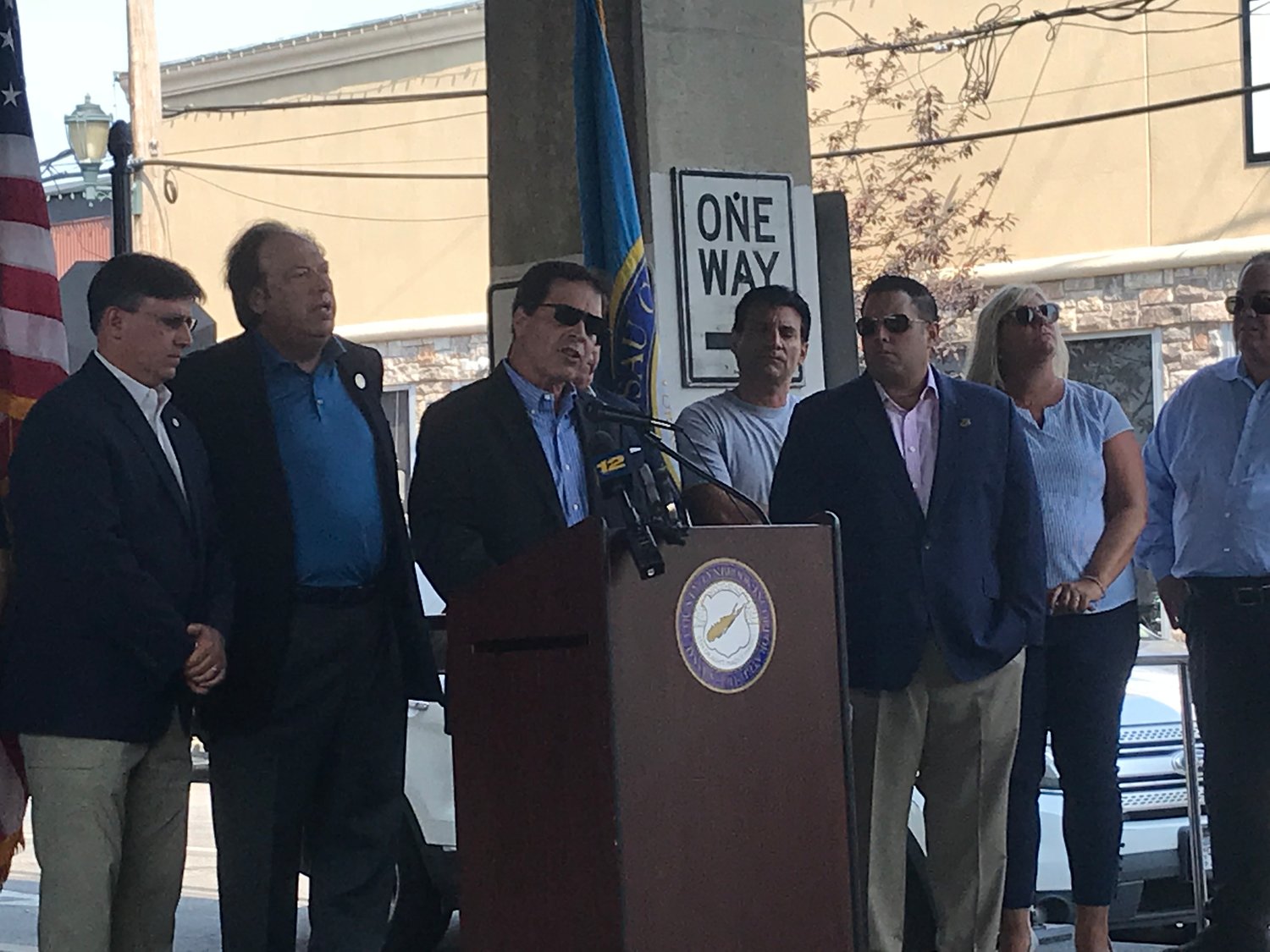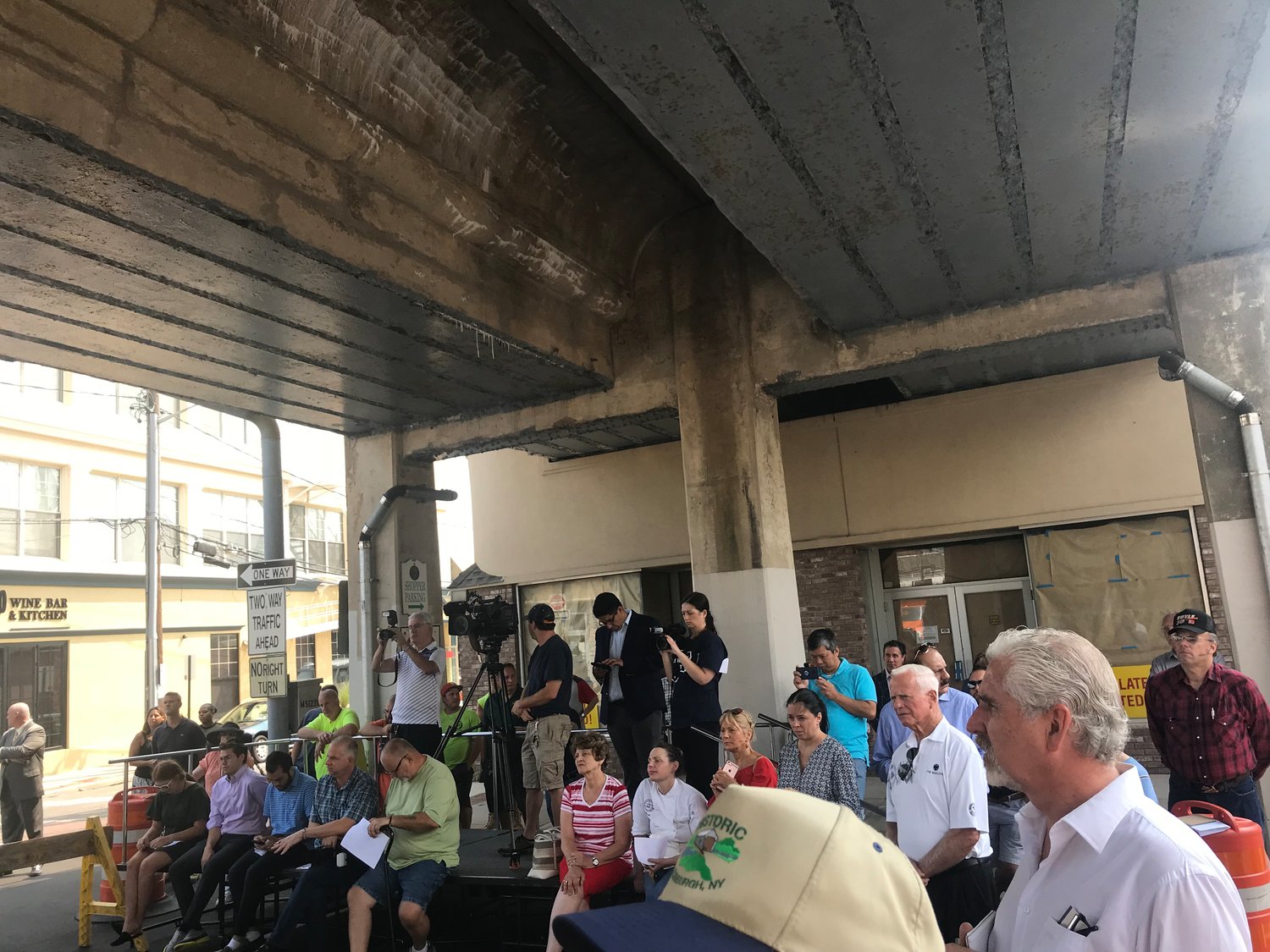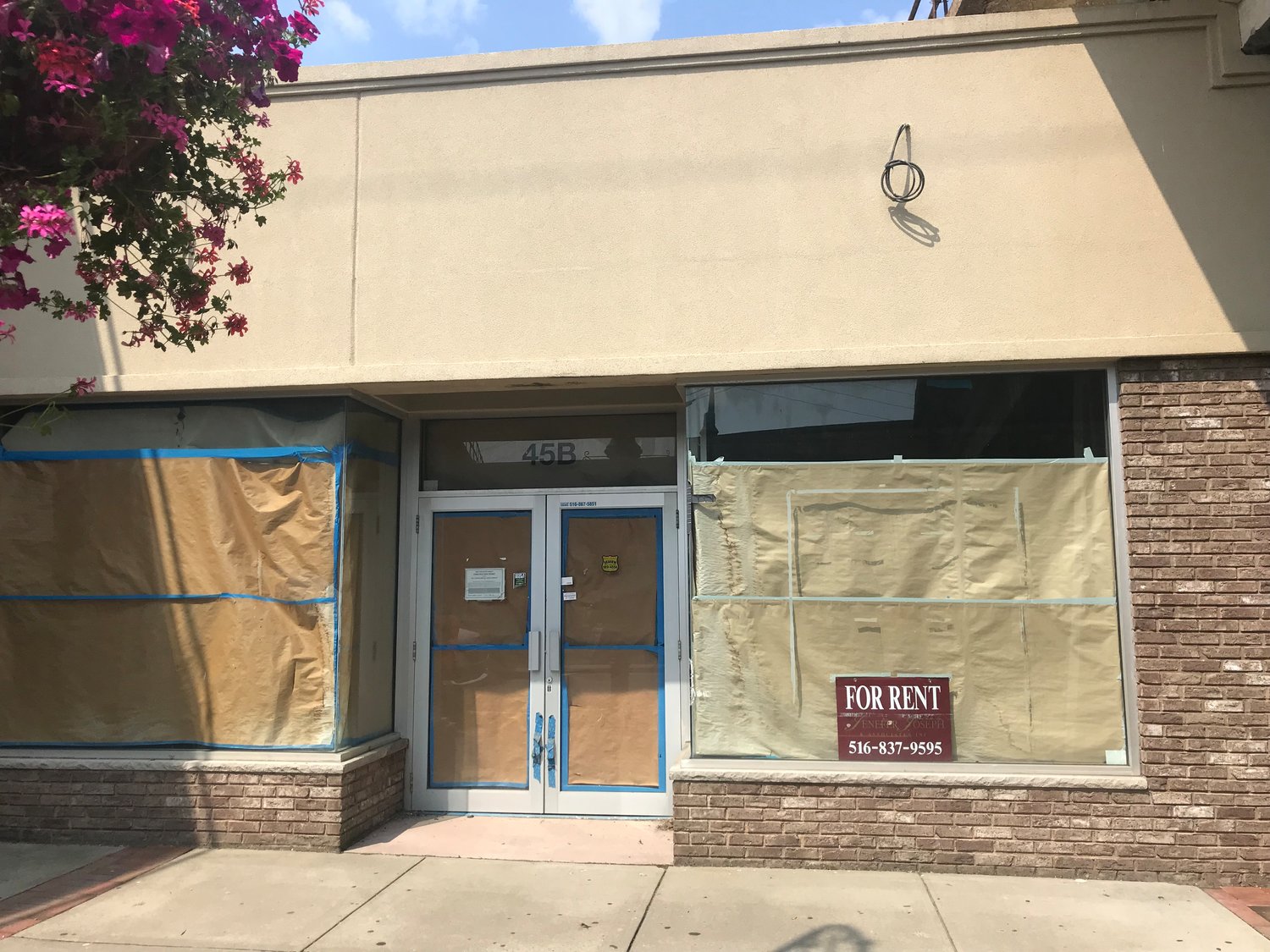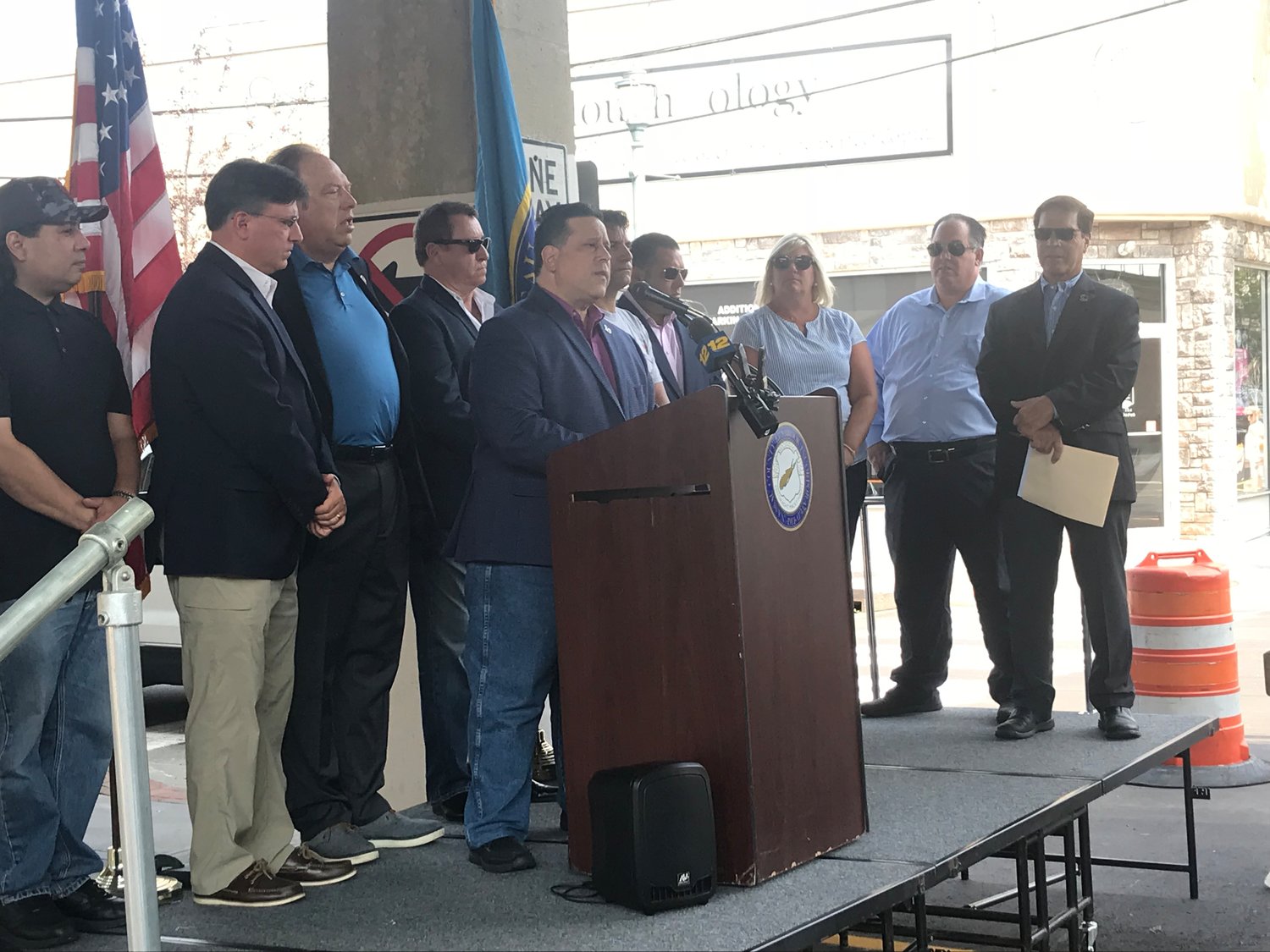Sunday, April 28, 2024
Rally in Lynbrook presses National Grid, DEC and elected officials on natural gas moratorium
Standing on a platform under the Long Island Rail Road trestle at Atlantic and Stauderman avenues, flanked by several business owners and elected officials, Lynbrook Mayor Alan Beach decried a natural-gas moratorium that he said is hurting Lynbrook businesses.
With dozens of people at the Aug. 7 rally, Beach pleaded for National Grid, the state Department of Environmental Conservation and New York and New Jersey elected officials to end an impasse tied to a rejected $1 billion, 24-mile gas supply pipeline.
“We are here today because of an alarming development that threatens to derail our local economy and reverse the great strides we’ve made to revitalize our downtown,” Beach said to applause.
Two months ago, National Grid officials said they would not permit new gas hookups for homes and businesses, which has caused businesses to struggle to expand their operations. The announcement came after New York and New Jersey rejected the new pipeline, called the Northeast Supply Enhancement Project.
Beach said he organized the rally to show state officials and National Grid the impact that the moratorium has had on small businesses. He delivered his message near several vacant stores that he said the village would have trouble filling during the moratorium. Some 2,400 applications for new gas hook-ups have been denied on Long Island.
On May 15, the DEC denied the permit application for developer Williams Co. to build a pipeline in New York waterways, saying it would violate water-quality standards. New Jersey has also rejected applications for permits. Williams has resubmitted its applications, and they are under review, a DEC spokesperson said, adding, “DEC takes [its] role extremely seriously to prevent any deterioration of our natural resources.”
National Grid spokesman Domenick Graziani said the utility would like to supply gas service, but cannot. “The infrastructure serving the region has reached full capacity and is unable to meet growing demand,” he said. “The Northeast Supply Enhancement Project is needed to access additional supplies of natural gas required for new or expanded service requests in Brooklyn, Queens and Long Island.”
Graziani said the project requires approval from New York and New Jersey for it to move forward and be complete by winter. Until it is approved, National Grid is denying requests for new or additional natural gas, saying new gas hookups could compromise the supply system and the connections of existing customers.
To make up for the supply gap, Graziani said, National Grid has been purchasing additional gas supplies through short-term spot market contracts, but they are not guaranteed from one year to the next, are dependent on market availability and are not a sustainable solution. “We still remain cautiously optimistic that NESE will be approved,” Graziani said, “and that we’ll soon be able to resume processing requests for new gas service.”
But at the rally, several speakers said the tug-of-war among National Grid, the DEC, and New York and New Jersey officials is only hurting local economies.
“Small business once again finds itself the unintended victim of a much larger battle,” Lynbrook Chamber of Commerce President Steve Wangel said. “While environmentalists and lawmakers grapple with the prospect of clean, renewable energy, small business and the middle class have become their collateral damage.”
Wangel said the reduced gas supply has led to vacant storefronts and a loss of employment in Nassau and Suffolk counties, the five boroughs and lower Westchester County.
Many speakers noted that they favored clean energy and environmentally friendly fuels, but until the methods are a viable alternative, natural gas is needed.
Dominic Natoli, who owns the recently opened Il Pozzo Wine Bar & Kitchen on Atlantic Avenue, said the moratorium nearly prevented his business from opening. He added that he was worried about heating the restaurant in the winter, and that he and his partners made a significant investment in Lynbrook with the anticipation of finding success, but may struggle as the standoff persists.
“We’re on the cusp right now of having enough gas for our kitchen,” Natoli said. “Let’s stop this catfight and come to a reasonable solution for everybody, and we can see Lynbrook succeed with what we’re trying to do here.”
Robert Schwartzah, who maintains several properties under the LIRR station, said he has had difficulty renting three of the stores because potential owners realize they will not have gas.
Chamber Vice President Jeffrey Greenfield, who owns the NGL Group insurance company and was the master of ceremonies for the event, said the village is being held hostage, and he has one message for those with the ability to end the moratorium: “Turn our gas on.”
Other speakers included County Legislator William Gaylor, Hempstead Town Councilman Anthony D’Esposito and Eric Alexander, the director of Vision Long Island, a Northport-based nonprofit smart-growth advocacy group that promotes downtown redevelopment. Alexander said that 40 Long Island downtowns were affected by the moratorium, as well as 10,000 units of transit-oriented housing and hundreds of businesses, restaurants, homes and office spaces. He added that 65 major projects — such as Phase Two of the Ronkonkoma Hub — have been held up.
“This hurts real people,” Alexander said. “It just doesn’t hurt business folks. It hurts residents in the neighborhood. It hurts school districts. It hurts taxpayers. It hurts folks wanting jobs. It hurts the vitality of our downtowns that we care about.”
Deputy Mayor Michael Hawxhurst shared his thoughts as the rally was ending. “We need our politicians to listen to us,” he said. “We need them to support us, and we need them to do the right thing: Work with National Grid to get this done.”
HELP SUPPORT LOCAL JOURNALISM
The worldwide pandemic has threatened many of the businesses you rely on every day, but don’t let it take away your source for local news. Now more than ever, we need your help to ensure nothing but the best in hyperlocal community journalism comes straight to you. Consider supporting the Herald with a small donation. It can be a one-time, or a monthly contribution, to help ensure we’re here through this crisis. To donate or for more information, click here.
Sponsored content
Other items that may interest you













